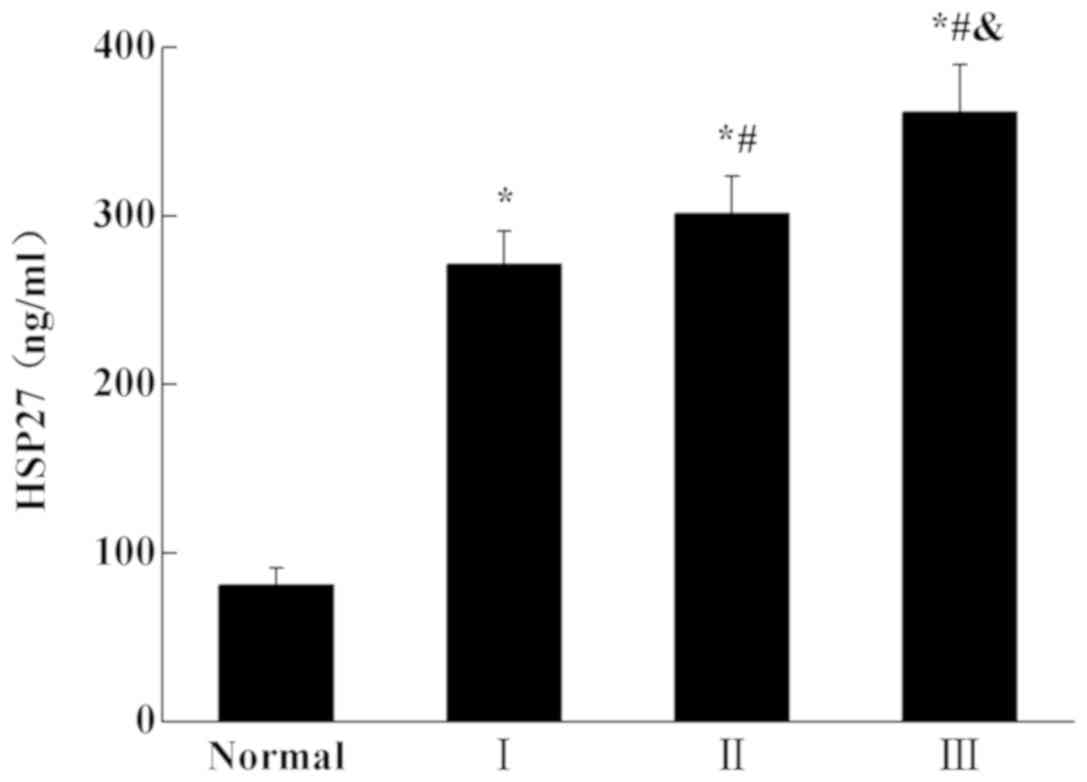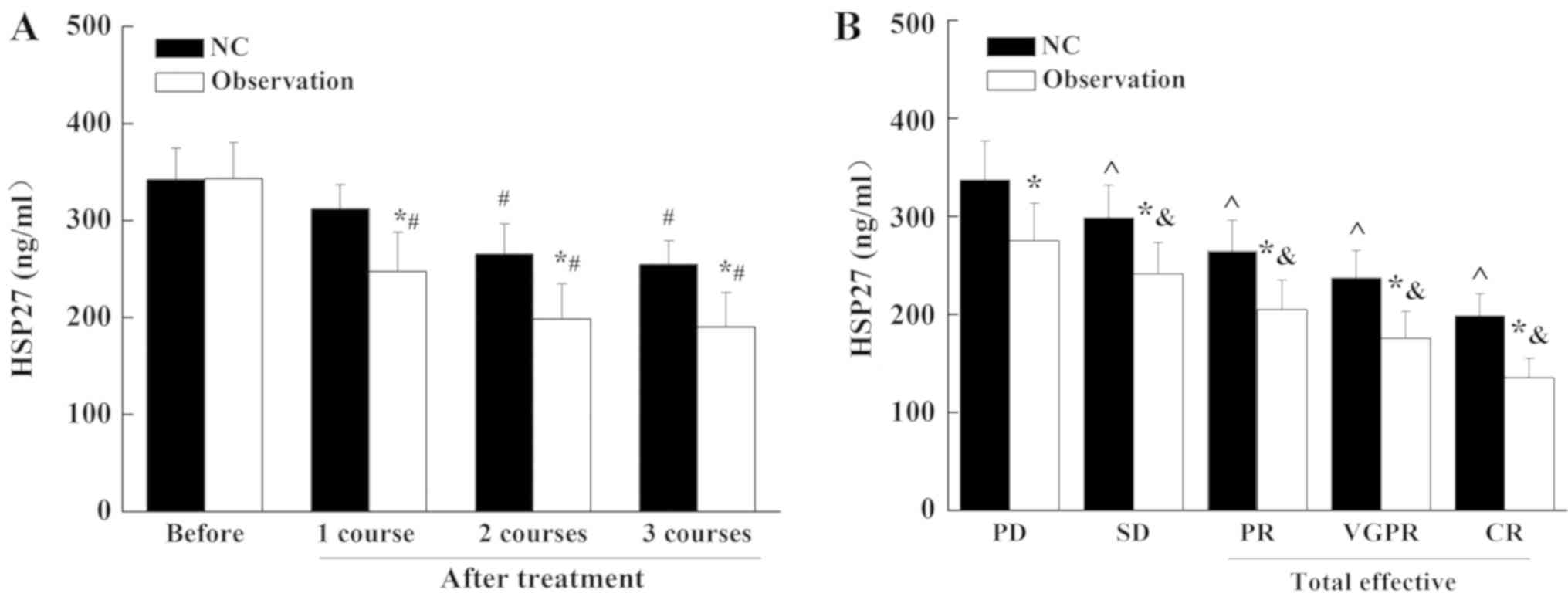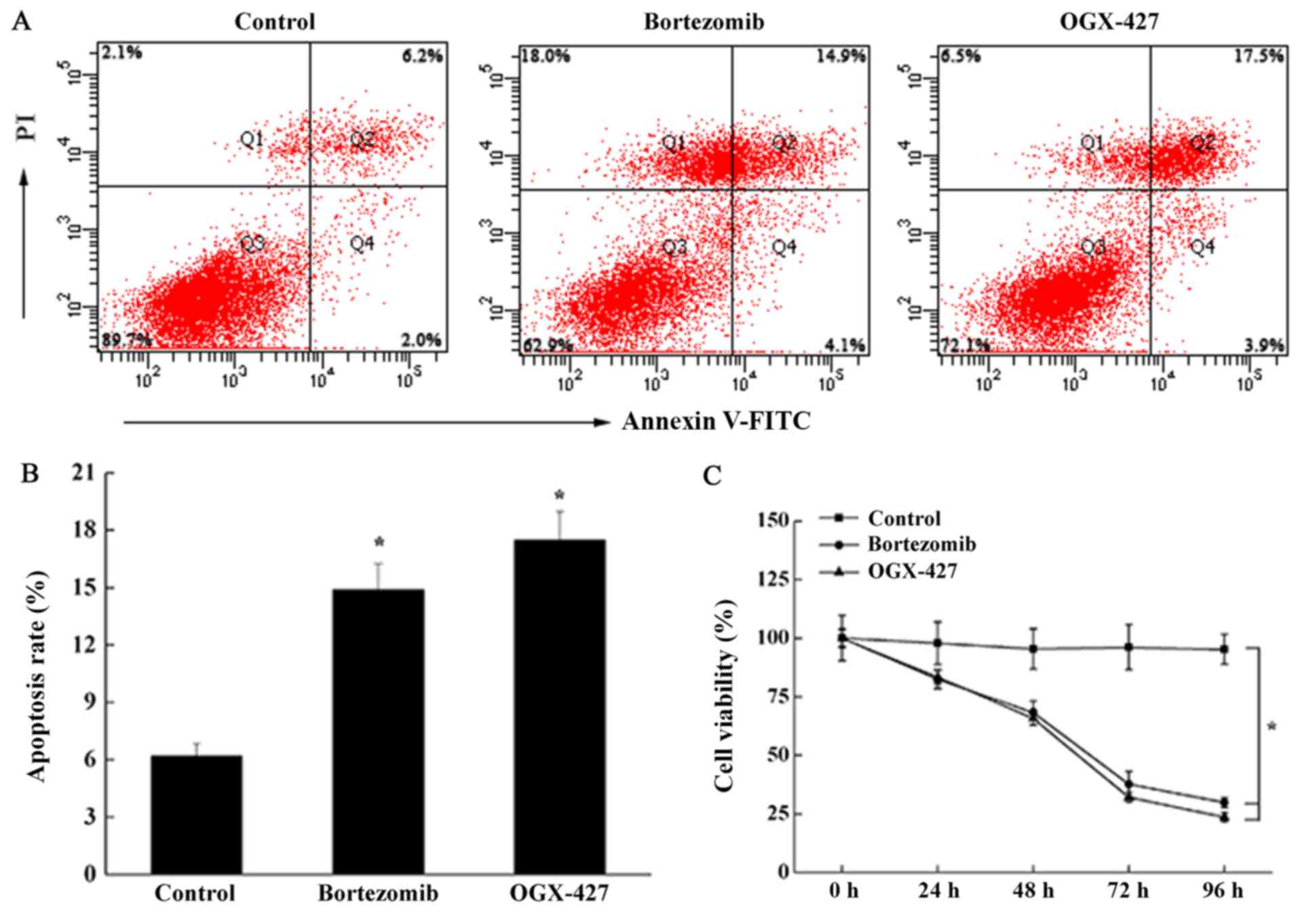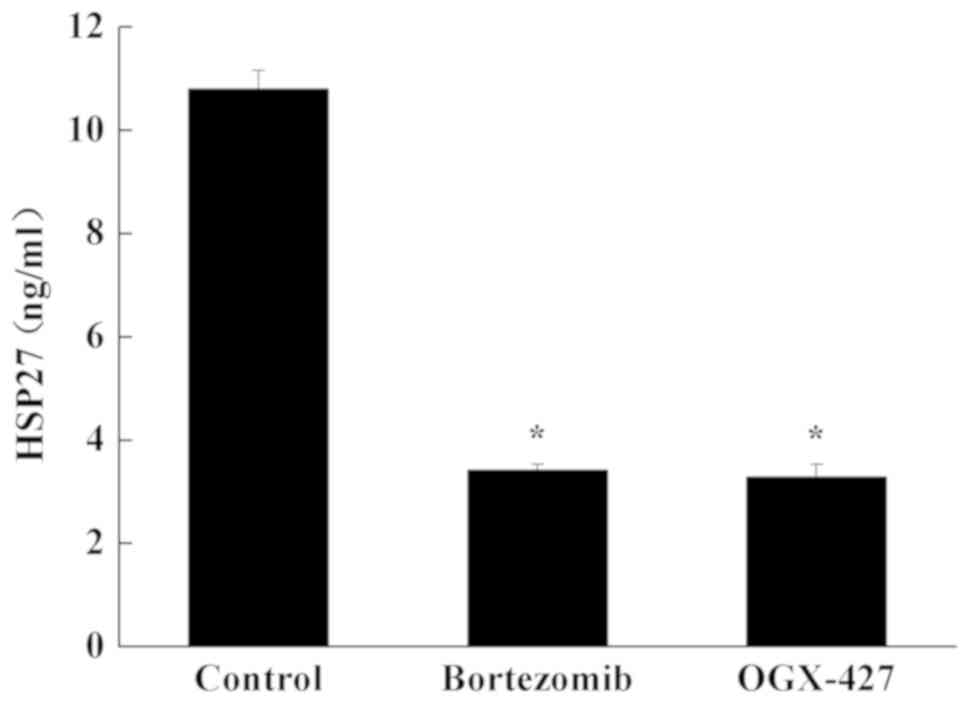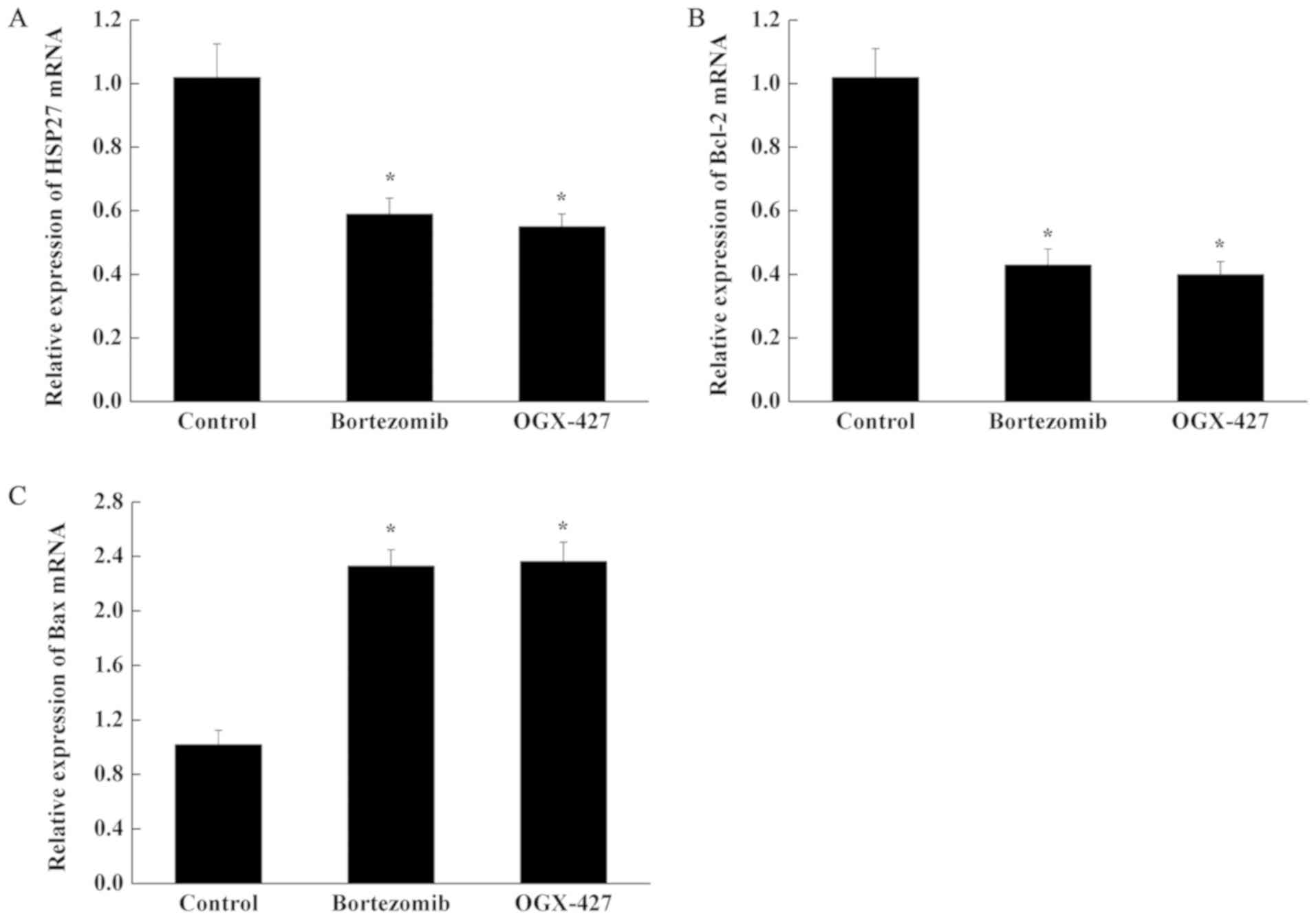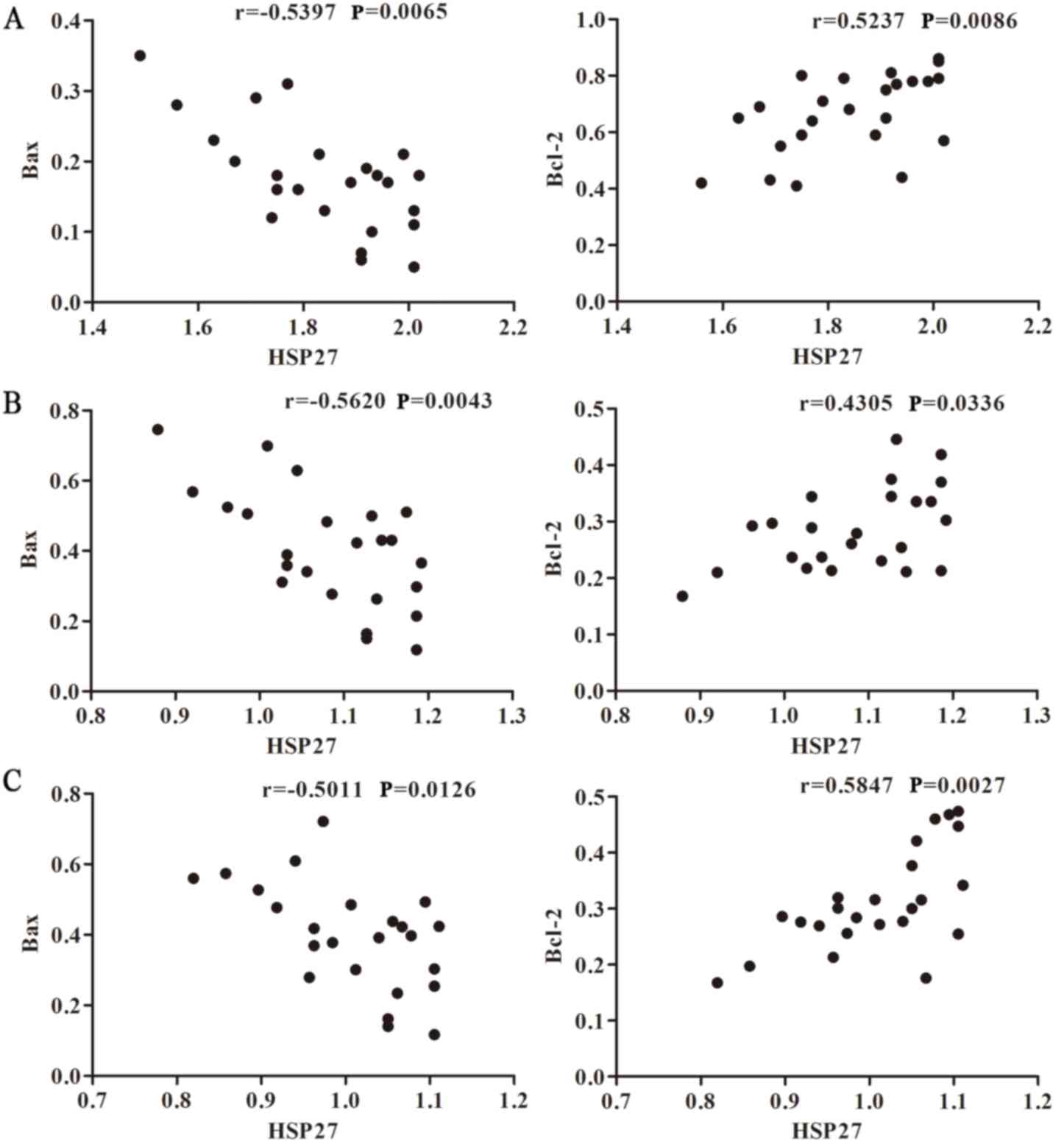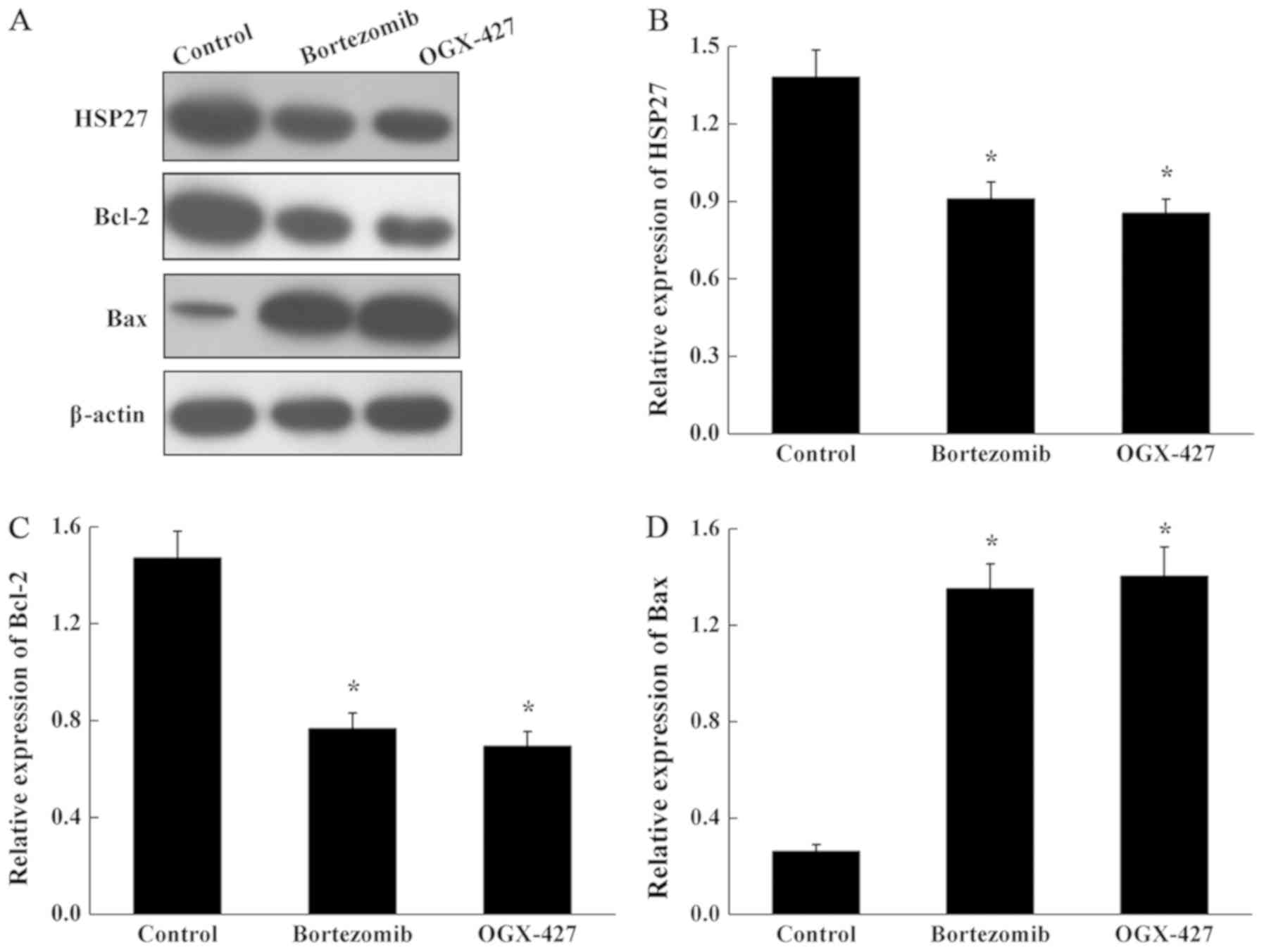|
1
|
Palumbo A and Anderson K: Multiple
myeloma. N Engl J Med. 364:1046–1060. 2011. View Article : Google Scholar : PubMed/NCBI
|
|
2
|
Zhang L, Fok JH and Davies FE: Heat shock
proteins in multiple myeloma. Oncotarget. 5:1132–1148. 2014.
View Article : Google Scholar : PubMed/NCBI
|
|
3
|
Vos T, Allen C, Arora M, Barber RM, Bhutta
ZA, Brown A, Carter A, Casey DC, Charlson FJ, Chen AZ, et al:
Global, regional, and national incidence, prevalence, and years
lived with disability for 310 diseases and injuries, 1990–2015: A
systematic analysis for the Global Burden of Disease Study 2015.
Lancet. 388:1545–1602. 2016. View Article : Google Scholar : PubMed/NCBI
|
|
4
|
Michels TC and Petersen KE: Multiple
myeloma: Diagnosis and treatment. Am Fam Physician. 95:373–383.
2017.PubMed/NCBI
|
|
5
|
Mahindra A, Hideshima T and Anderson KC:
Multiple myeloma: Biology of the disease. Blood Rev. 24 (Suppl
1):S5–S11. 2010. View Article : Google Scholar : PubMed/NCBI
|
|
6
|
Khan SA and Cohen AD: Experimental
approaches in the treatment of multiple myeloma. Ther Adv Hematol.
2:213–230. 2011. View Article : Google Scholar : PubMed/NCBI
|
|
7
|
Costa LJ, Gonsalves WI and Kumar S: Early
mortality in multiple myeloma: Risk factors and impact on
population outcomes. Blood. 124:13202014.PubMed/NCBI
|
|
8
|
Peña C, Rojas C, Rojas H, Soto P, Cardemil
D, Aranda S, Contreras C, La Roca G, Russo M, Pérez C, et al:
Survival of 1,103 Chilean patients with multiple myeloma receiving
different therapeutic protocols from 2000 to 2016. Rev Med Chil.
146:869–875. 2018.(In Spanish). View Article : Google Scholar : PubMed/NCBI
|
|
9
|
Landgren O: Shall we treat smoldering
multiple myeloma in the near future? Hematology Am Soc Hematol Educ
Program. 2017:194–204. 2017. View Article : Google Scholar : PubMed/NCBI
|
|
10
|
Briqle K and Roqers B: Pathobiology and
diagnosis of multiple myeloma. Semin Oncol Nurs. 33:225–236. 2017.
View Article : Google Scholar : PubMed/NCBI
|
|
11
|
Abdalla AO, Kokhaei P, Hansson L,
Mellstedt H and Osterborg A: Idiotype vaccination in patients with
myeloma reduced circulating myeloma cells (CMC). Ann Oncol.
19:1172–1179. 2008. View Article : Google Scholar : PubMed/NCBI
|
|
12
|
Khandia R, Munjal AK, Iqbal HMN and Dhama
K: Heat shock proteins: Therapeutic perspectives in inflammatory
disorders. Recent Pat Inflamm Allergy Drug Discov. 10:94–104. 2017.
View Article : Google Scholar : PubMed/NCBI
|
|
13
|
Calderwood SK and Gong J: Heat shock
proteins promote cancer: It's a protection racket. Trends Biochem
Sci. 41:311–323. 2016. View Article : Google Scholar : PubMed/NCBI
|
|
14
|
Campanella C, Rappa F, Sciumè C, Marino
Gammazza A, Barone R, Bucchieri F, David S, Curcurù G, Caruso
Bavisotto C, Pitruzzella A, et al: Heat shock protein 60 levels in
tissue and circulating exosomes in human large bowel cancer before
and after ablative surgery. Cancer. 121:3230–3229. 2015. View Article : Google Scholar : PubMed/NCBI
|
|
15
|
Richardson PG, Chanan-Khan AA, Alsina M,
Albitar M, Berman D, Messina M, Mitsiades CS and Anderson KC:
Tanespimycin monotherapy in relapsed multiple myeloma: Results of a
phase 1 dose-escalation study. Br J Haematol. 150:438–445.
2010.PubMed/NCBI
|
|
16
|
Richardson PG, Chanan-Khan AA, onial S,
Krishnan AY, Carroll MP, Alsina M, Albitar M, Berman D, Messina M
and Anderson KC: Tanespimycin and bortezomib combination treatment
in patients with relapsed or relapsed and refractory multiple
myeloma: Results of a phase 1/2 study. Br J Haematol. 153:729–740.
2011. View Article : Google Scholar : PubMed/NCBI
|
|
17
|
Stühmer T, Zöllinger A, Siegmund D,
Chatterjee M, Grella E, Knop S, Kortüm M, Unzicker C, Jensen MR,
Quadt C, et al: Signalling profile and antitumour activity of the
novel Hsp90 inhibitor NVP-AUY922 in multiple myeloma. Leukemia.
22:1604–1612. 2008. View Article : Google Scholar : PubMed/NCBI
|
|
18
|
Yu Z, Zhi J, Peng X, Zhong X and Xu A:
Clinical significance of HSP27 expression in colorectal cancer. Mol
Med Rep. 3:953–958. 2010.PubMed/NCBI
|
|
19
|
Cornford PA, Dodson AR, Parsons KF,
Desmond AD, Woolfenden A, Fordham M, Neoptolemos JP, Ke Y and
Foster CS: Heat shock protein expression independently predicts
clinical outcome in prostate cancer. Cancer Res. 60:7099–7105.
2000.PubMed/NCBI
|
|
20
|
Conroy SE, Sasieni PD, Amin V, Wang DY,
Smith P, Fentiman IS and Latchman DS: Antibodies to heat-shock
protein 27 are associated with improved survival in patients with
breast cancer. Br J Cancer. 77:1875–1879. 1998. View Article : Google Scholar : PubMed/NCBI
|
|
21
|
Chauhan D, Li G, Hideshima T, Podar K,
Mitsiades C, Mitsiades N, Catley L, Tai YT, Hayashi T, Shringarpure
R, et al: Hsp27 inhibits release of mitochondrial protein Smac in
multiple myeloma cells and confers dexamethasone resistance. Blood.
102:3379–3386. 2003. View Article : Google Scholar : PubMed/NCBI
|
|
22
|
Arts HJ, Hollema H, Lemstra W, Willemse
PH, De Vries EG, Kampinga HH and Van der Zee AG:
Heat-shock-protein-27 (hsp27) expression in ovarian carcinoma:
Relation in response to chemotherapy and prognosis. Int J Cancer.
84:234–238. 1999. View Article : Google Scholar : PubMed/NCBI
|
|
23
|
Richardson PG, Hideshima T and Anderson
KC: Bortezomib (PS-341): A novel, first-in-class proteasome
inhibitor for the treatment of multiple myeloma and other cancers.
Cancer Control. 10:361–369. 2003. View Article : Google Scholar : PubMed/NCBI
|
|
24
|
Rajkumar SV, Dimopoulos MA, Palumbo A,
Blade J, Merlini G, Mateos MV, Kumar S, Hillengass J, Kastritis E,
Richardson P, et al: International Mye-loma Working Group updated
criteria for the diagnosis of multiple myeloma. Lancet Oncol.
15:e538–e548. 2014. View Article : Google Scholar : PubMed/NCBI
|
|
25
|
Greipp PR, San Miguel J, Durie BG, Crowley
JJ, Barlogie B, Bladé J, Boccadoro M, Child JA, Avet-Loiseau H,
Kyle RA, et al: International staging system for multiple myeloma.
J Clin Oncol. 23:3412–3420. 2005. View Article : Google Scholar : PubMed/NCBI
|
|
26
|
Durie BG and Salmon SE: A clinical staging
system for multiple myeloma correlation of measured myeloma cell
mass with presenting clinical features, response to treatment and
survival. Cancer. 36:842–854. 1975. View Article : Google Scholar : PubMed/NCBI
|
|
27
|
Livak KJ and Schmittgen TD: Analysis of
relative gene expression data using real-time quantitative PCR and
the 2(-Delta Delta C(T)) method. Methods. 25:402–408. 2001.
View Article : Google Scholar : PubMed/NCBI
|
|
28
|
Raab MS, Podar K, Breitkreutz I,
Richardson PG and Anderson KC: Multiple myeloma. Lancet.
374:324–339. 2009. View Article : Google Scholar : PubMed/NCBI
|
|
29
|
Nakashima T, Ishii T, Tagaya H, Seike T,
Nakagawa H, Kanda Y, Akinaga S, Soga S and Shiotsu Y: New molecular
and biological mechanism of antitumor activities of KW-2478, a
novel nonansamycin heat shock protein 90 inhibitor, in multiple
myeloma cells. Clin Cancer Res. 16:2792–2802. 2010. View Article : Google Scholar : PubMed/NCBI
|
|
30
|
Eugênio AIP, Fook-Alves VL, de Oliveira
MB, Fernando RC, Zanatta DB, Strauss BE, Silva MRR, Porcionatto MA
and Colleoni GWB: Proteasome and heat shock protein 70 (HSP70)
inhibitors as therapeutic alternative in multiple myeloma.
Oncotarget. 8:114698–114709. 2017. View Article : Google Scholar : PubMed/NCBI
|
|
31
|
Boccadoro M, Morgan G and Cavenagh J:
Preclinical evaluation of the proteasome inhibitor bortezomib in
cancer therapy. Cancer Cell Int. 5:182005. View Article : Google Scholar : PubMed/NCBI
|
|
32
|
Adams J: Proteasome inhibition in cancer:
Development of PS-341. Semin Oncol. 28:613–619. 2001. View Article : Google Scholar : PubMed/NCBI
|
|
33
|
Ciocca DR and Vargas-Roig LM: Hsp27 as a
prognostic and predictive factor in cancer. Prog Mol Subcell Bill.
28:205–218. 2002. View Article : Google Scholar
|
|
34
|
Wei L, Liu TT, Wang HH, Hong HM, Yu AL,
Feng HP and Chang WW: Hsp27 participates in the maintenance of
breast cancer stem cells through regulation of
epithelial-mesenchymal transition and nuclear factor-κB. Breast
Cancer Res. 13:R1012011. View
Article : Google Scholar : PubMed/NCBI
|
|
35
|
Gonzalez-Mejia ME, Voss OH, Murnan EJ and
Doseff AI: Apigenin-induced apoptosis of leukemia cells is mediated
by a bimodal and differentially regulated residue-specific
phosphorylation of heat-shock protein-27. Cell Death Dis.
1:e642010. View Article : Google Scholar : PubMed/NCBI
|
|
36
|
Lanneau D, Brunet M, Frisan E, Solary E,
Fontenay M and Garrido C: Heat shock proteins: Essential proteins
for apoptosis regulation. J Cell Mol Med. 12:743–761. 2008.
View Article : Google Scholar : PubMed/NCBI
|















